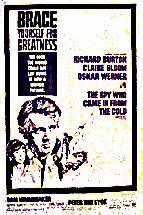
The Spy Who Came in from the Cold (1965)

Spying is a grim, desperate business that is at once boring and exciting, and this adaptation of John Le Carré's novel artfully conveys that sense. Audiences must have preferred the more glamorous spies like James Bond because this film, which was one of the best ever made on the subject, failed to gather much interest at the box office.
Produced and directed by Martin Ritt in Ireland and England, with some second unit lensing in Europe, the film stars Richard Burton as a burned-out case, a man who is looking forward to getting out of the spy game and retiring from British Intelligence. Just before he is to leave, Alec is summoned to London and called on the carpet. It seems that several of his subagents have been caught by Hans-Dieter Mundt (Peter Van Eyck), who is Alec's counterpart on the East Berlin side. Hans-Dieter is a former Nazi who has taken over as chief of operations for the Communists, and his handiwork is putting a crimp in the British operations. Since it is well known that Alec is tired of what he's doing, Alec's boss, Control (Cyril Cusack), gives him his final assignment.
Lemas' last assignment is to masquerade as a drunk who wants to defect to the East Germans. If it works and Alec gets inside the Communist operations, he can find out if there is a "mole" in their own organization as well as get the goods on what's happening inside the East German operation. As part of his cover, Alec takes a job at a library and there meets Nan Perry (Claire Bloom), a member of the Communist party. He has a fling with her, then later, acting the drunken bully, he beats a shopkeeper and ends up in jail. Defection When he is released, he is contacted by East German agents who believe he is ready to defect. He is taken to East Berlin, where he is grilled by Fiedler (Oskar Werner), Hans-Dieter's top assistant.
Fiedler is convinced that Hans-Dieter is a double agent and believes Alec can provide information proving his theory. Alec genuinely believes the idea is absurd and continually insists that to Fiedler Nevertheless, Fiedlerhas gathered enough evidence to have Hans-Dieter arrested, and a trial is begun to determine Hans-Dieter's fate. Alec is stunned when Nan is brought in to testify at the trial, and he suddenly realizes his bosses have set him up—Hans-Dieter is indeed a double agent, and the whole plot has been constructed to discredit Fielder, who is getting too close to the truth. The plan works as the tables are turned at the trial, and Fiedler is found to be the subversive element.
Once the trial is over, Hans-Dieter arranges to have Alec and Nan—who is a meek and unwitting woman not part of the cabal, and who loves Alec—taken to the Berlin Wall, where they are to be shown to safety. Alec despises Hans-Dieter and is appalled by the whole operation, and when Nan is gunned down at the wall (authorities never had any intention of allowing her to leave), Alec refuses to climb over the wall and is himself killed.
Burton is excellent as the weary and cynical agent who has seen too much, and his performance garnered him one of his seven Oscar nominations. There are no gimmicks, no fast cars that turn into airplanes, no weapons that fire lasers, just a tense battle of wits shot in stark black and white. The title refers to the time when an outside spy has to "come in from the cold" and take a sedentary job as another spy's control or even some menial desk assignment until the mandatory age limit forces retirement. Only Graham Greene has come close to Le Carré in detailing the emotional drudgery of the espionage world.
The semidocumentary (and film noir) fashion in which Oswald Morris shot the film added to the believability of the story and won him the British Film Academy's award as Best Black-and-White Cinematographer. It also won awards from the British Film Academy as Best British Film, for Burton as Best Actor, and to the art direction team for Best Black-and-White Art Direction. The movie was also nominated for Oscars for Best Art Direction and Best Actor (Burton).
Cast
Richard Burton, Alec Leamas
Claire Bloom, Nan Perry
Oskar Werner, Fiedler
Peter Van Eyck, Hans-Dieter Mundt
Sam Wanamaker, Peters
George Voskovec, East German Defense Attorney
Rupert Davies, Smiley
Cyril Cusack, Control
Michael Hordern, Ashe
Production
Producer, Martin Ritt
Director, Martin Ritt
Screenwriter, Paul Dehn and Guy Trosper, Based on the novel by John Le Carré
Edito,r Anthony Harvey
Cinematographer, Oswald Morris